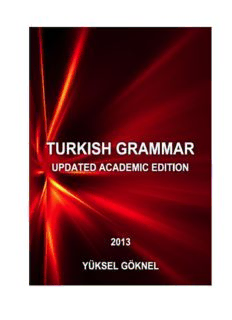
turkish grammar updated academic edition yüksel göknel PDF
Preview turkish grammar updated academic edition yüksel göknel
TURKISH GRAMMAR UPDATED ACADEMIC EDITION 2013 1 TURKISH GRAMMAR UPDATED ACADEMIC EDITION 2013 Ege Reklam Basım Sanatları San.Tic. Ltd. Sti. Esatpasa Mahallesi Ziyapasa Caddesi No:4 34704 Atasehir / ISTANBUL T. : +90 216 470 44 70 F.: +90 216 472 84 05 W. : www.egebasim.com.tr 2.Basım: İstanbul / Ocak 2013 ISBN: 978-6056301810 2 TURKISH GRAMMATRU URPKDISAHT GERDA AMCMAADRE MIC EDITION 2013 FOREWORD The Turkish Grammar book that you have just started reading is quite different from the grammar books that you read in schools. This kind of Grammar is known as traditional grammar. The main difference of a traditional grammar and that of a transformational one is that the first one describes a natural language as a static object, but the second one describes both the parts of the language engine and how it runs. This is like learning about a motionless car. There is something lacking in this description. It is the dynamics of the parts of a car that runs a hundred and twenty kilometers an hour. Traditional grammars describe only the physical appearance of a language; they do not mind what goes on behind the curtain. The mind of a human being works like the engine of a sports car. It arranges and chooses words matching one another, transforms simple sentence units to use in different parts of sentences, and recollects morphemes and phonemes to be produced by the human speech organs. All these activities are simultaneously carried out by the human mind. Another point that the traditional grammarians generally miss is that they write the grammar of a certain language to teach it to those who have been learning it from the time when they were born up to the time when they discover something called grammar. This is like teaching a language to professional speakers. Then, what is the use of a grammar? I believe most people were acquainted with it when they started learning a foreign language. Therefore, a grammar written for those who are trying to learn a second language is very useful both in teaching and learning a second language. I started teaching English as a second language in 1952, a long time ago. Years passed and one day I found myself as a postgraduate Fulbright student at the University of Texas at Austin in 1960. Although I studied there for only a short period, I learnt enough from Prof. Archibald A. Hill and Dr. De Camp to stimulate me to learn more about Linguistics. After I came back to Turkey, it was difficult to find books on linguistics in booksellers in Istanbul. Thanks to The American Library in Istanbul, I was able to borrow the books that attracted my attention. In those books, I discovered Noam Chomsky, whose name I had not heard during my stay in the U.S.A. I must confess that I am indebted to the scholars and the library above in writing this Turkish Grammar. I am also grateful to my son Dr. Özgür Göknel who encouraged me to write this book and to Vivatinell Warwick U.K., which sponsored to publish it. YÜKSEL GÖKNEL I 3 TURKISH GRAMMAR UPDATED ACADEMIC EDITION 2013 4 TURKISH GRAMMAR UPDATED ACADEMIC EDITION 2013 . 5 TURKISH GRAMMAR UPDATED ACADEMIC EDITION 2013 6 TURKISH GRAMMAR UPDATED ACADEMIC EDITION 2013 TURKISH GRAMMAR UPDATED ACADEMIC EDITION YÜKSEL GÖKNEL Email: [email protected] Vivatinell Bilim-Kültür Yayınları 2013 Grafik Tasarım Uygulamaları Vivatinell Press Selami Burhan GÖKAY İletişim: Vivatinell Cosmopharmaceutics Fetih Mah. Tunca Sk. No:2 34704 Ataşehir / İstanbul / TÜRKİYE Tel: +90 216 470 09 44 Faks: +90 216 470 09 48 7 TURKISH GRAMMAR UPDATED ACADEMIC EDITION 2013 8 TURKISH GRAMMAR UPDATED ACADEMIC EDITION 2013 CONTENTS Foreword 3 Contents 9 Logical, Morphemic, and Oral Sequencing 15 The Turkish Grammar 18 The Turkish Vowel and Consonant Harmony 19 The Vowel Harmony Sequence 19 The Consonant Harmony 21 Morphemes and Their Allomorphs 24 Derivational Morphemes and Their Allomorphs 25 Morphemes Attached to Nouns to Produce Nouns 25 Morphemes Attached to Nouns to Produce Adjectives 26 Morphemes Attached to Adjectives to Produce Nouns 29 Morphemes Attached to Verbs to Produce Nouns 30 Morphemes Attached to Verbs to Produce Adjectives 34 Morphemes Attached to Nouns to Produce Verbs 35 Morphemes Attached to Adjectives to Produce Verbs 36 Inflectional Morphemes and Their Allomorphs 36 Nominal Phrases 39 Adverbs and Adverbials 42 The Transformational Activity of the Logic 43 Form and Function in Languages 45 Using Adjectives as Adverbs 47 The Inflectional Morphemes 49 The Defining [İ] Morpheme and Its Allomorphs [i, ı, ü, u] 50 The [LE], [LE.YIN] and [E], [DE], [DEN] Inflectional Morphemes 55 [LE] allomorphs: [le, la] 55 [LE.YIN]: 56 [E], [DE], [DEN] and [LE] Morphemes 56 [E] allomorphs: [e, a] 58 [DE] allomorphs: [de, da, te, ta] 64 [DEN] allomorphs: [den, dan, ten, tan] 66 “Possessor + Possessed” Noun Compounds (İsim Tamlamaları) 68 Definite Noun Compounds (Belirtili İsim Tamlamaları) 68 Indefinite Noun Compounds (Belirtisiz İsim Tamlamaları) 75 Noun Compounds Without Suffixes (Takısız Tamlamalar) 75 Noun + Infinitive Compounds (İsim Mastar Tamlamaları) 77 Prepositions and Postpositions (Edatlar or İlgeçler) 78 Primary Stress, Secondary Stress, and Intonation 79 9
Description: